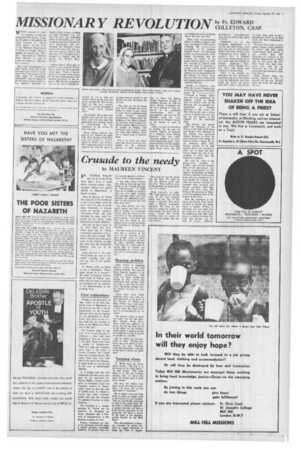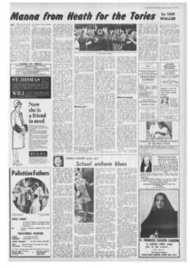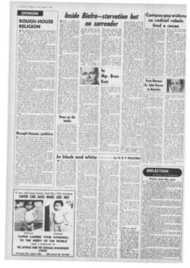Page 7, 17th October 1969
Page 7

Report an error
Noticed an error on this page?If you've noticed an error in this article please click here to report it.
Tags
Share
Related articles
Recruiting For Latin America
Founder Dismisses Easy Life
The Holy I
A Rosary With 426 Families
Episcopal Engagements
Crusade to the needy
by MAUREEN VINCEN1
FR, THOMAS WALSH runs the Crusade of the Holy Spirit from a small house situated rather unexpectedly behind the parish church at Blackheath, in South London.
Born in Athlone, Fr. 'Walsh was ordained to the priesthood in the United States, where he spent about 18 years in parish work. Gradually, he became aware of another vocation. "Successive Popes had been stressing the great need for priests in the poorer areas. particularly in Latin America."
The idea of the Crusade of the Holy Spirit was born. Three years ago Fr. Walsh commenced operations in Salamanca. His aim is simple. "We want to help in the most needy areas of the Church, to help the poor and the abandoned wherever they are to be found."
Latin America is his goal. "Thirty-three per cent of the world's Catholics with only nine per cent of the world's priests!"
Fr. Walsh could not afford to stay in Salamanca. "Providence placed us in London." He came to England without much hope of finding vocations, but has been astonished and delighted by the response to his advertisements in the Catholic Press.
First ordinations
Thanks to the generosity of Mgr. Clark, as he then was, parish priest of Blackheath at the time, he was able to set up headquarters for the Crusade. Just now there are six students for the priesthood in Blackheath; they travel across London each day by minibus to study at the Missionary Institute at Mill Hill.
The students range in age from 23 to 43 and comprise an Irishman, a Scot and four Englishmen. Two are converts to the faith. They come from a variety of backgrounds. There is a poet, an ex-display artist from a big store, a former Customs and Excise man and a student teacher. Between them they have held jobs in the restaurant business, in social work, in nursing and in the care of handicapped children.
It is hoped that the first ordination will take place next year. In the meantime, Fr. Francis Duffy, a former parish priest in Liverpool, heads the Crusade's mission in Montevideo, where he has the care of 30,000 souls. Fr. Walsh is hoping that other volunteer priests will join the Crusade for periods of service in Latin America.
The Crusade is a secular institute. Fr. Walsh has no intention of founding an Order. Members take a Promise of Incorporation to the Institute in, place of vows.
Women volunteers are also to be welcomed and will make a similar promise, renewable annually. At present there are two women members at Blackheath. both trained teachers.
I met Miss Eileen O'Neil. who told me that she had first heard of the Crusade through an advertisement. "I thilik there are a number of teachers who are not really satisfied with teaching alone—who find teaching not sufficiently apostolic for the vocation they feel they may have."
For Miss O'Neil, the Cni• sade's appeal has been in its call to women to co-operate closely with the priests in the real work of the apostolate in all its variety. "You don't feel that you are going to get bogged down on any one thing. like teaching or nursing," she explains.
The first essential for women who feel a vocation to the work of the Institute is that they should [earn to speak Spanish. the language of most of Latin America, fluently. "This does not mean that we would like to restrict our membership to women who have had a professional training."
Housing problem
Miss O'Neil is attending Spanish classes at the local evening institute. "We must be fluent Spanish speakers to be effective missionaries. The work will mean visiting the people in their homes and everything that springs from the visits, in the line of youth work, discussion groups. family service, training of catechists."
There have been many enquiries from men and women interested in the work of the Crusade. Fr. Walsh and Miss O'Neil hope that more applicants will be able to make a start when the acute problem of accommodation can be solved.
The present house is really too small even for the members already living there. Apart from the question of space. dry rot has been found in the fabric of the building, which makes it imperative that new premises should be found as quickly as possible.
But Fr. Walsh has the optimism of faith. "Finding this house was little short of miraculous." he says. "Perhaps some kind benefactor will give us the kind of house we really need."
Teeming slums
Fr. Walsh does not worry about finance. "All that is in the hands of the Holy Spirit," he says simply, "The main thing is to get the Crusade moving here. In about five years we should have at least seven priests."
He does not believe that there is any shortage of vocations. "At least, not of the right kind of vocations."
He is utterly convinced that there is today an urgent need in the Church for his Crusade. "We are specifically dedicated to help in the needy areas. We go with a different approach: a secular institute can have a more flexible approach to the apostolate. We want to return to the spirit of the Apostles, guided directly by the Holy Spirit."
The old-established missionary societies, he points out, went to pagan countries to bring the faith to pagans.
"They went out into the jungle and the bush. We shall go into the teeming slums and the cities. There will be none of the glamour of going down river in a canoe!"
More seriously. he adds: "The faith depends on the big cities. In the cities political power and the fate of the nation is decided. This thing needs a different missionary approach. We have to use whatever means are needed to draw people. The work will be mostly outside the church building—with the object of attracting the people into the real Church."
blog comments powered by Disqus











